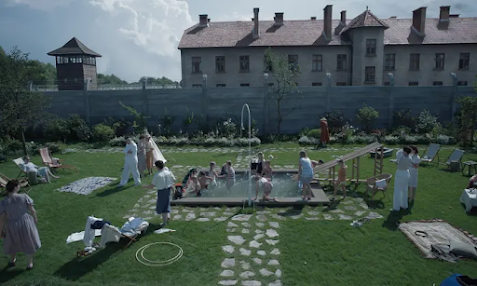Jake Schapiro '24 | 'The Zone of Interest' is a Brilliant, Uncomfortable Film
At the 2024 Oscars, 'The Zone of Interest' won Best International Film (along with Best Sound). The film, nominated for a total of five awards, including Best Picture, is based on Martin Amis’s 2014 novel of the same name. Starring German actors Christian Friedel and Sandra Hüller, the film centers on the lives of Auschwitz commandant Rudolf Höss and his wife Hedwig in 1943. As actually happened in real life, the Hösses live in a charming house with their five children, right next to the concentration camp, separated only by a fence.
The Holocaust is a well-trod subject for movies, if one that is extremely difficult for filmmakers. How much attention should go to the victims versus the perpetrators? How much of the atrocities should be shown on screen versus left to the imagination? Most well-known Holocaust films (Schindler’s List, Defiance, The Pianist) focus primarily on the victims of Nazi crimes. This makes sense, as the audience then has someone that they can root for: regardless of whether or not the characters survive the story, the audience is invested in caring about these people.
'The Zone of Interest' takes a startlingly different approach. Almost the entire film takes place in the Höss’ house, with the audience never actually seeing Auschwitz: the crematoria, gas chambers, and barracks are all absent. The only reminders of where we are is the smoke and the sound of screaming. All of the main characters are Nazis, with their victims mostly existing only as background figures. And what of the Hösses? They are depicted as an ordinary mid-century couple, who happen to be upper-echelon Nazis. Hedwig delights in trying on a fur coat (taken from a Jewish prisoner); Rudolf takes a work meeting in his office (about how to streamline the burning process); and their children play in a river nearby. The characters we meet are not cartoonish sadists, but a family trying to lead a prosperous life. Here is the banality of evil.
Ultimately, do I think that the movie does full justice to the Holocaust? No. Could any one movie ever fully capture the horrors of that genocide (or any genocide)? No. But I think that this movie serves an important purpose, placing an important piece of glass into the mosaic that is the Holocaust movie genre. Films about the Holocaust by definition deal with the darkest elements of humanity, the parts that we would prefer to either ignore or distance ourselves from as much as possible. It’s easy to do that when the perpetrators are presented as brutal monsters (which many of them were). But it is more unsettling when the perpetrators that we meet are ordinary people, going about their lives in a mostly normal fashion. How many of us have ever spent an afternoon catching up with friends or exploring nature, just as these characters do?
In 'The Zone of Interest,' the audience can recognize something of themselves in the characters, and that is uncomfortable. The movie forces the viewer to consider how they might act if they were in a similar situation, or even how they act in the present—none of us may literally live next to a death camp, but atrocities still happen today. The distance between the viewer and the characters of The Zone of Interest is less than people may like to think, and the movie does a service in reminding us of that.

Comments
Post a Comment